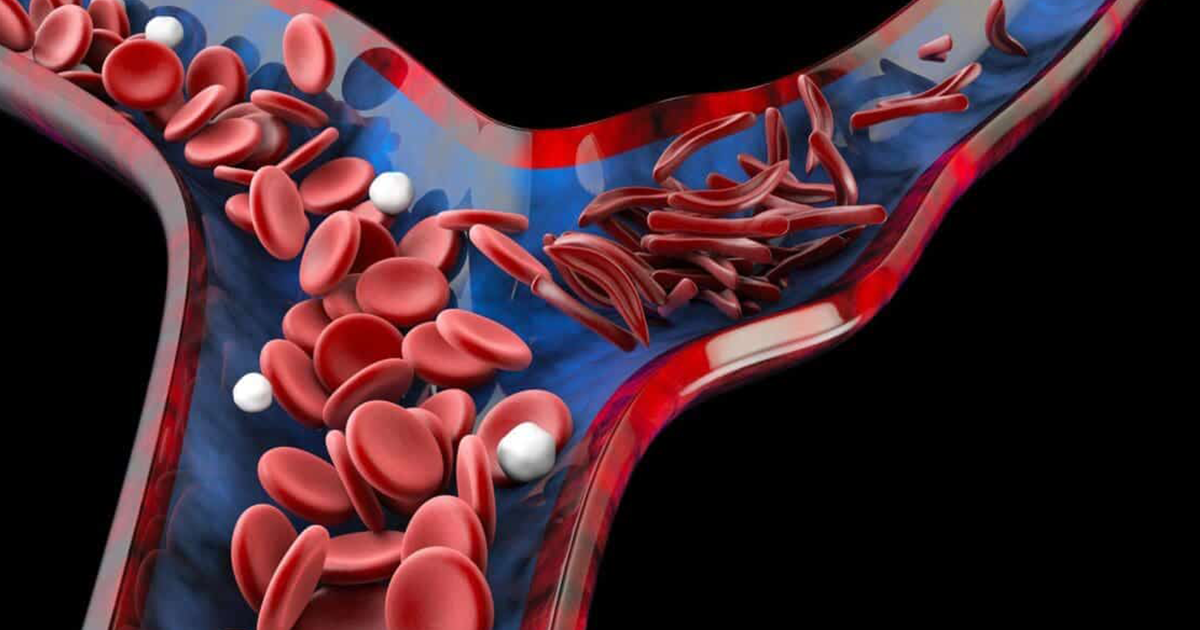Sickle cell disease (SCD) is a genetic condition characterized by abnormal hemoglobin that distorts red blood cells into a rigid, sickle shape. These altered cells can block blood flow, causing painful vaso-occlusive crises, inflammation, and tissue damage. Due to these complications, individuals with SCD often experience chronic pain, fatigue, and frequent infections. While SCD is most common in people of African descent, it also affects Hispanic, South Asian, and Middle Eastern populations. Recent research suggests that nutrients like omega-3 fatty acids and polyphenols may help mitigate symptoms by targeting inflammation, oxidative stress, and blood cell membrane stability.
Prevalence of Sickle Cell Disease
In the United States, SCD is most prevalent among African Americans, with about 1 in 365 African American children born with the disease. Additionally, around 1 in 13 African American babies are born with sickle cell trait, a condition in which they carry one sickle cell gene and can pass it on to their children. The disease also impacts Hispanic Americans (about 1 in 16,300 Hispanic American children), though to a lesser extent. Although rare in Asian and Caucasian populations, SCD does occur due to genetic variation and ancestry from regions where SCD is more prevalent.
The Role of Omega-3 Fatty Acids in Sickle Cell Disease
Omega-3 fatty acids are essential fats primarily found in fish and some plant sources, with eicosapentaenoic acid (EPA) and docosahexaenoic acid (DHA) being particularly beneficial. These omega-3s are well-known for their anti-inflammatory properties, which can be especially valuable for individuals with SCD, who often have heightened inflammation that exacerbates symptoms.
Research indicates that omega-3 supplementation may reduce the frequency of painful vaso-occlusive crises. One study demonstrated that omega-3s help improve red blood cell membrane fluidity, preventing cells from clumping together and blocking blood vessels (Daak et al., 2014). Additionally, the anti-inflammatory effects of omega-3s can support cardiovascular health and reduce complications often seen in people with SCD (Nader et al., 2020).
The Impact of Polyphenols on Oxidative Stress in SCD
Polyphenols, abundant in fruits, vegetables, and green tea, are powerful antioxidants that combat oxidative stress, a key factor in the progression of SCD. Due to the chronic inflammation and cell damage associated with the disease, oxidative stress is often elevated in individuals with SCD, leading to further complications (Nur et al., 2011).
Certain polyphenols, such as resveratrol, have shown promise in not only reducing oxidative stress but also promoting the production of fetal hemoglobin (HbF), which has been linked to milder symptoms in SCD patients (Zhang et al., 2020). Increasing HbF levels can reduce the proportion of sickle hemoglobin, potentially alleviating the severity of symptoms.
BalanceOil+: A Convenient Source of Omega-3s and Polyphenols
Incorporating both omega-3 fatty acids and polyphenols into daily nutrition can be a powerful way to support health for those living with sickle cell disease. BalanceOil+ provides a unique combination of omega-3s and polyphenols, helping to ensure an optimal balance of these nutrients in one simple supplement. BalanceOil+ not only delivers essential omega-3s but also includes polyphenols that work synergistically to reduce inflammation, improve cell membrane function, and combat oxidative stress. This combination is particularly beneficial for individuals with SCD who are looking to support their overall health and manage symptoms naturally.
Take the Next Step Toward Better Health
To learn more about how BalanceOil+ and other targeted approaches can support your health, consider scheduling a free consultation with Robert Ferguson. He can guide you on how to integrate essential nutrients for better metabolic health and overall well-being, tailored to your unique needs.
References
-
- Daak, A. A., et al. “Omega 3 (n-3) and omega 6 (n-6) fatty acids in sickle cell disease: effects on inflammatory and vascular mediators.” Prostaglandins, Leukotrienes and Essential Fatty Acids 90.2-3 (2014): 45-50.
- Nur, E., et al. “Oxidative stress in sickle cell disease; pathophysiology and potential implications for disease management.” American Journal of Hematology 86.6 (2011): 484-489.
- Zhang, D., et al. “The beneficial effects of polyphenols on sickle cell disease: Antioxidant properties and beyond.” Nutrients 12.2 (2020): 328.
- Nader, E., et al. “Impact of omega-3 fatty acids in sickle cell disease.” Journal of Clinical Medicine 9.10 (2020): 3298.
- Centers for Disease Control and Prevention. “Data & Statistics on Sickle Cell Disease.” CDC, 2020.
_______________
🗓️ Schedule a FREE consultation with Robert Ferguson about becoming a client: SCHEDULE FREE CONSULTATION
👉🏽 To order the BalanceOil+ with the BalanceTEST, > CLICK HERE
👉🏽 Watch a free online presentation on the BalanceOil+ and the BalanceTEST: WATCH NOW.
_______________
Robert Ferguson is a California- and Florida-based single father of two daughters, nutritionist, researcher, best-selling author, speaker, podcast and television host, health advisor, NAACP Image Award Nominee, creator of the Diet Free Life methodology, Chief Nutrition Officer for iCoura Health, and he serves on the Presidential Task Force on Obesity for the National Medical Association. You can e-mail Robert at robert@dietfreelife.com.


0 Comments